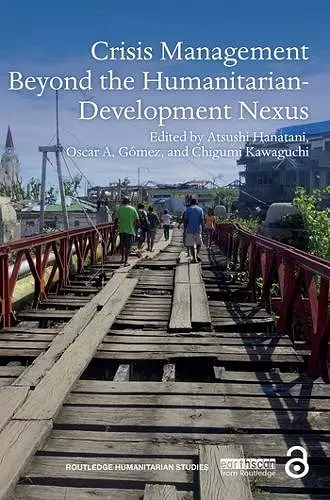Crisis Management Beyond the Humanitarian-Development Nexus
Oscar A Gómez editor Atsushi Hanatani editor Chigumi Kawaguchi editor
Format:Paperback
Publisher:Taylor & Francis Ltd
Published:4th Mar '20
Currently unavailable, and unfortunately no date known when it will be back
This paperback is available in another edition too:
- Hardback£145.00(9781138543430)

In addressing humanitarian crises, the international community has long understood the need to extend beyond providing immediate relief, and to engage with long-term recovery activities and the prevention of similar crises in the future. However, this continuum from short-term relief to rehabilitation and development has often proved difficult to achieve. This book aims to shed light on the continuum of humanitarian crisis management, particularly from the viewpoint of major bilateral donors and agencies. Focusing on cases of armed conflicts and disasters, the authors describe the evolution of approaches and lessons learnt in practice when moving from emergency relief to recovery and prevention of future crises.
Drawing on an extensive research project conducted by the Japan International Cooperation Agency Research Institute, this book compares how a range of international organizations, bilateral cooperation agencies, NGOs, and research institutes have approached the continuum in international humanitarian crisis management. The book draws on six humanitarian crises case studies, each resulting from armed conflict or natural disasters: Timor-Leste, South Sudan, the Syrian crisis, Hurricane Mitch in Honduras, the Indian Ocean earthquake and tsunami in Indonesia, and Typhoon Yolanda. The book concludes by proposing a common conceptual framework designed to appeal to different stakeholders involved in crisis management.
Following on from the World Humanitarian Summit, where a new way of working on the humanitarian-development nexus was highlighted as one of five major priority trends, this book is a timely contribution to the debate which should interest researchers of humanitarian studies, conflict and peace studies, and disaster risk-management.
"The continuum in Rwanda after the genocide and in Indonesia after the Tsunami were typical of the unstructured processes which accompany the transition from humanitarian relief to development. The extent to which local ownership of governments and civil society is prepared and empowered to take charge following man-made or natural disasters is a major determinant of the length and sustainability of recovery. In the absence of standard patterns and processes, we are left with sets of principles and values, which are ultimately much more valuable as a guide to action. This book does well to distinguish the very different circumstances of recovery, both from natural disasters and from conflict." — Stephen Browne, former UN Humanitarian and Development Coordinator
"The aid world is split into development and humanitarian assistance. This book tackles the long-standing question of how different aid instruments can best be combined to meet human needs defying categorization. It provides a rich series of case studies, as well as a unique Japanese perspective on the continuum of aid." — Julia Steets, Director of the Global Public Policy Institute (GPPi)
"This is an ambitious and honest effort to address and deconstruct the on-going dilemma of responding to one crisis after the other in increasingly complex environments. This collection of articles demonstrates the non-linear nature of recovery and reconstruction. It is recommended reading for practitioners and scholars." — Margareta Wahlstrom, President of Swedish Red Cross and former Special Representative of the UN Secretary General for Disaster Risk Reduction
"An important contribution to current global conversations around crisis prevention and sustaining peace. Through detailed case studies from some of the most difficult conflict and disasters of the past 30 years, this book brings new analysis to the dilemmas around linking emergency response and long-term development that have eluded the aid sector for decades." — Christina Bennett, Humanitarian Policy Group, Overseas Development Institute, UK
"Natural disasters and man-made conflicts can often precipitate a humanitarian crisis. As the number of people in the world affected by such humanitarian crises increases every year, it is important to understand the underlying causes of crises to manage them better. [This] book...edited by able and senior experts of humanitarian and development field...is out to help us think about these pressing issues." — Brij Chauhan, book review in Southasiadisasters.net ‘Trans-Boundary Early Warning Systems in Asia’, Issue No. 180, January 2019
ISBN: 9780367504991
Dimensions: unknown
Weight: 367g
256 pages